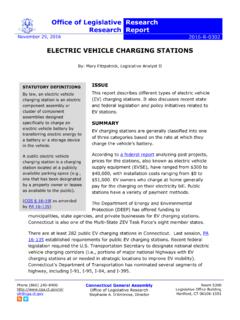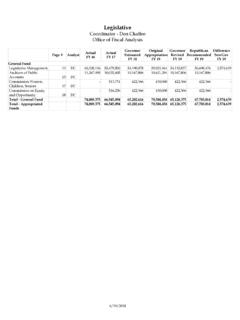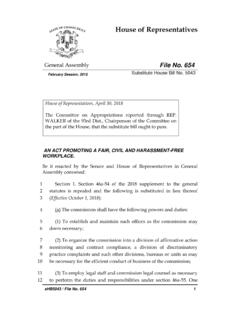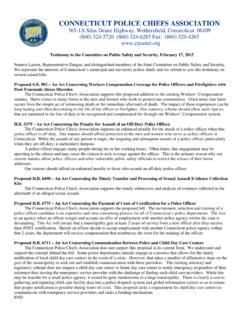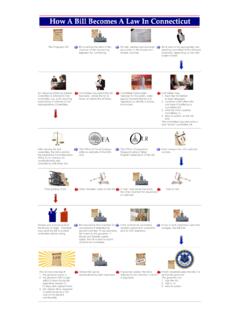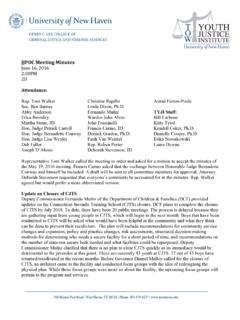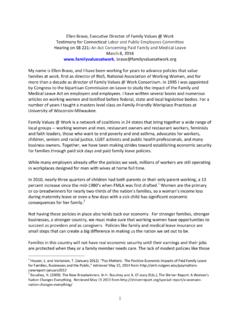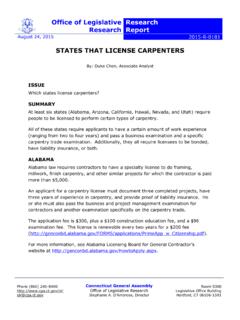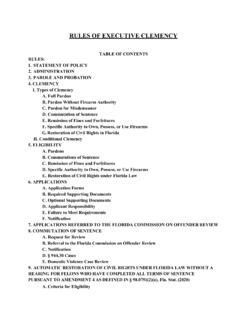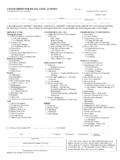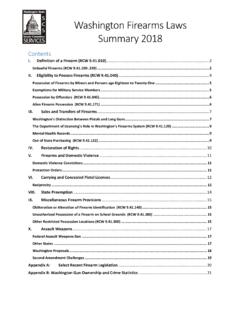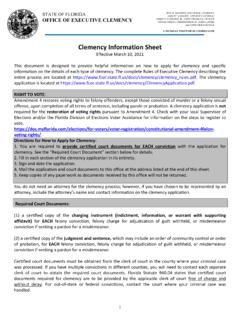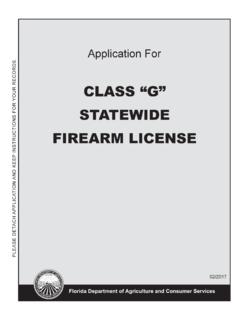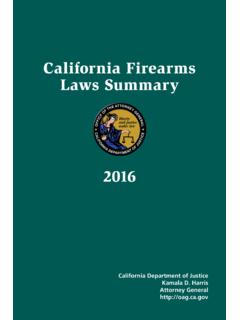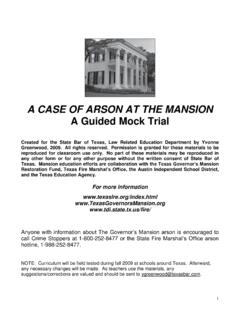Transcription of Summary of State Gun Laws - Connecticut General Assembly
1 Summary of State Gun laws By: OLR Staff January 31, 2020 | 2020-R-0025. Issue Summarize Connecticut 's gun laws . (This report updates OLR Report 2013-R-0001.). Summary The Connecticut Constitution (Article First, 15) gives every citizen the right to bear arms in defense of himself or herself and the State . For regulatory purposes, State law designates four types of firearms: handguns (pistols and revolvers), long guns (rifles and shotguns), assault weapons, and machine guns. The degree of regulation depends on the type of firearm and, for sales and transfers, whether they are being conducted by federal firearms licensed gun dealers or by private sellers not required to be licensed.
2 Certain categories of people may not legally possess firearms or get credentials to carry them. With few exceptions, (1) anyone acquiring a handgun in Connecticut , whether from a federally licensed gun dealer or private seller, must have an eligibility certificate or a permit to sell or carry handguns and (2) anyone carrying a handgun must have a permit to carry handguns. No permit or certificate is required to possess lawfully acquired handguns in one's home or at one's place of business. Anyone buying or otherwise acquiring a handgun in Connecticut , including at a gun show, or applying for a gun permit or eligibility certificate must follow prescribed procedures and meet certain statutory criteria ( , passing criminal history checks and being deemed suitable).
3 The Department of Emergency Services and Public Protection (DESPP) must authorize all handgun transfers, whether by licensed dealers or private sellers. And applicants for a gun permit or eligibility certificate must pass a DESPP-approved course on handgun safety and use. Connecticut General Assembly (860) 240-8400. Office of Legislative Research Room 5300. Stephanie A. D'Ambrose, Director Legislative Office Building With certain exceptions, anyone acquiring a long gun in Connecticut must present a valid long gun eligibility certificate, handgun eligibility certificate, handgun permit, or gun dealer's permit. The law does not require a permit or other credential to carry long guns.
4 Long gun sales and transfers generally must conform to specified State procedures ( , criminal history checks). The procedures differ in some respects for gun dealers versus other sellers. State law generally requires anyone buying ammunition to have an ammunition certificate or a State -issued gun credential and be at least age 18. Additionally, with exceptions, the law prohibits selling, buying, or possessing large capacity magazines (LCM) unless the owner lawfully possessed the magazine before the ban took effect and declared them to DESPP. Generally, LCMs are magazines that can hold more than 10 rounds of ammunition. With minor exceptions, State law prohibits giving an assault weapon to anyone; distributing, transporting, or importing an assault weapon; or keeping, offering, or exposing any such weapon for sale.
5 It also, with minor exceptions, prohibits possession of an assault weapon unless the owner lawfully possessed the weapon before the ban took effect and obtained a certificate of possession from DESPP for it (in effect, registered the weapon). Machine guns are legal if duly registered with the federal Bureau of Alcohol, Tobacco, Firearms and Explosives (ATF) and DESPP. It is illegal to use them for offensive or aggressive purposes, as defined in law, or to transfer them to anyone under age 16. Federal law contains a court procedure for restoring firearm privileges lost because of a federal commitment or adjudication; State law contains a similar procedure for restoring privileges lost because of a State adjudication or commitment.
6 Gun dealers must be federally licensed and if they sell handguns, they must obtain a local permit to sell them. They must follow specified procedures when selling firearms and meet other criteria in law. The law, with few exceptions, prohibits carrying firearms at certain locations, such as on school property or in any building where either chamber of the legislature is located or where the legislature is holding a public hearing or meeting. The law requires people to store loaded firearms in their homes in a way that minors under age 18. do not have unauthorized access to them. It prohibits transferring handguns to minors under age 21, except as authorized for temporary use at firing or shooting ranges.
7 Additionally, the law 2020-R-0025 January 31, 2020 Page 2 of 53. generally prohibits storing or keeping a handgun in an unattended motor vehicle if the firearm is not in the trunk, a locked safe, or a locked glove box. The law generally makes individuals subject to certain civil orders of protection ineligible (1) for gun permits or firearms eligibility certificates and (2) to possess firearms and ammunition. By law, the DESPP commissioner must follow a specific process to reinstate revoked credentials and return firearms and ammunitions when the civil protection order expires. Under limited circumstances and specified procedures, law enforcement officials may get warrants and seize firearms from people posing an imminent risk of harming themselves or someone else, and a court may order the firearms held for up to one year.
8 In addition to the topics mentioned above, State law also regulates other gun-related matters. For example, recent laws set restrictions on bump stocks and "ghost guns.". In a number of areas, there are related federal laws not discussed in this report. Please refer to Table 4 at the end of the report for a description of firearm offenses and penalties and Table 5 for the penalties for various classes of offenses. 2020-R-0025 January 31, 2020 Page 3 of 53. Table of Contents Handguns .. 6. Permit Needed to Sell Handguns over Certain Limit .. 6. Permit Required to Carry Handguns .. 6. Permit or Eligibility Certificate Required to Buy or Get Handguns .. 8. Revocation.
9 8. Confidentiality of Gun Permit and Certificate Information .. 8. People Barred From Possessing Handguns or Getting Credentials .. 9. Handgun Sale/Transfer Procedures .. 10. Suspended Prosecution .. 11. Handgun Safety Provisions .. 12. Long 12. Permit or Eligibility Certificate Required to Buy or Get Long Guns .. 12. People Barred From Possessing Long Guns .. 13. Minimum Age for Possessing Long Guns or Getting Credentials .. 13. Long Gun Sales and Transfer 14. Sawed-Off Shotguns .. 16. Ammunition .. 16. Ammunition Certificate .. 16. Large Capacity Magazines (LCM) .. 18. Armor Piercing Bullets .. 20. Assault 22. Definition .. 22. Prohibitions and Penalties .. 25. Exemptions.
10 26. Relinquishment of Assault Weapon to Law Enforcement Agency .. 27. Certificate of Possession .. 27. Standards Governing Registered Assault Weapons .. 28. Machine Guns .. 28. Board of Firearms Permit Examiners .. 30. Gun Seller Regulations .. 30. Alarm System .. 30. Employees Selling Firearms .. 30. Limits on Where Gun Dealers May Sell Handguns .. 31. 2020-R-0025 January 31, 2020 Page 4 of 53. Civil Orders of Protection and 31. Types of Orders .. 31. Gun Permits and Firearms Eligibility 31. Eligibility to Possess Firearms and Ammunitions .. 32. Transfer, Delivery, or Surrender of Firearms and Ammunition .. 32. Reinstatement of Revoked 32. Return of Firearms and Ammunition.
